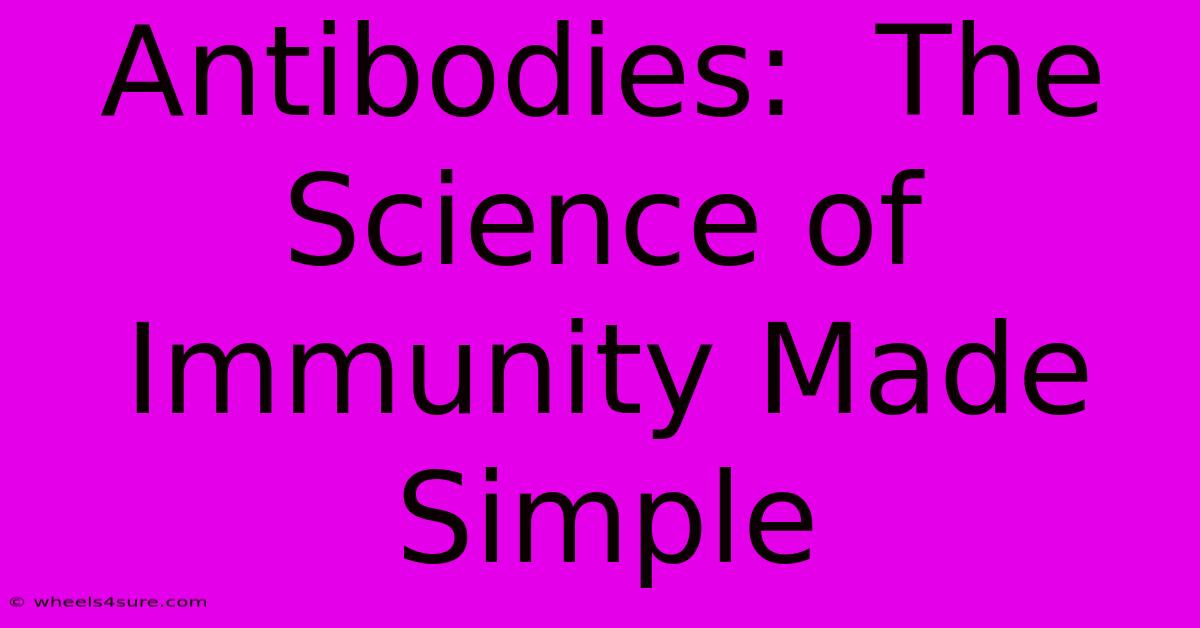Antibodies: The Science Of Immunity Made Simple

Table of Contents
Antibodies: The Science of Immunity Made Simple
Our bodies are amazing, intricate machines, constantly battling invaders like bacteria and viruses. A crucial part of this defense system is our immune system, and within that system, a key player is the antibody. Understanding antibodies is key to understanding how our bodies fight off infection and disease. This article breaks down the science of antibodies in a simple, easy-to-understand way.
What are Antibodies?
Antibodies, also known as immunoglobulins (Ig), are Y-shaped proteins produced by specialized white blood cells called plasma cells. These plasma cells are themselves a type of B cell, a lymphocyte that plays a vital role in the adaptive immune response. Think of antibodies as highly specialized, targeted missiles designed to seek out and neutralize specific threats.
How Antibodies Work: A Targeted Attack
Antibodies achieve this neutralization through several mechanisms:
- Neutralization: Antibodies bind to the surface of pathogens (disease-causing organisms), preventing them from infecting cells. It's like disabling a weapon before it can be used.
- Opsonization: Antibodies coat the surface of pathogens, making them more easily recognized and engulfed by phagocytes, cells that act like the body's garbage disposal, consuming and destroying invaders. This process essentially flags the pathogens for destruction.
- Complement Activation: Antibodies can trigger the complement system, a cascade of proteins that further enhances pathogen destruction. Think of it as calling in reinforcements for a more powerful attack.
- Agglutination: Antibodies can clump pathogens together, making them easier to remove from the body. It's like gathering all the enemies into one easily eliminated group.
The Different Types of Antibodies
There are five main types of antibodies, each with its own specific role:
- IgA: Found in mucous membranes (like those lining the respiratory and digestive tracts), IgA protects against invading pathogens at the entry points of the body. It's your first line of defense against many infections.
- IgD: Primarily found on the surface of B cells, IgD's function isn't fully understood, but it's believed to play a role in B cell activation.
- IgE: Primarily involved in allergic reactions and defense against parasites. It's responsible for the inflammatory responses you feel during allergies.
- IgG: The most abundant antibody in the blood, IgG plays a major role in providing long-term immunity. It's also crucial in protecting against many types of bacterial and viral infections.
- IgM: The first antibody produced during an infection. Its presence often indicates a recent or ongoing infection. It's highly effective at activating the complement system.
Antibodies and Immunity: A Long-Term Partnership
The adaptive immune system relies on memory B cells, which are long-lived cells capable of producing large amounts of antibodies specific to a particular pathogen. Upon re-exposure to the same pathogen, these memory cells quickly produce antibodies, preventing or reducing the severity of the infection. This is the basis of immunological memory, which is how vaccines work. Vaccines introduce a weakened or inactive form of a pathogen, triggering the production of memory B cells without causing the disease, and this prepares the body for a future encounter with the real pathogen.
Antibodies and Medical Applications
Understanding antibodies has led to significant advances in medicine. Monoclonal antibodies, laboratory-produced antibodies that are all identical, have revolutionized the treatment of various diseases, including cancer and autoimmune disorders. These targeted therapies specifically attack disease cells while minimizing harm to healthy cells. The development of antibody-based therapies continues to be a vital area of medical research.
Conclusion: A Powerful Defense System
Antibodies are a vital part of our immune system, playing a critical role in protecting us from a wide range of pathogens. Their specific targeting, diverse functions, and ability to generate long-term immunity make them essential for maintaining health. Understanding the science behind these amazing molecules helps us appreciate the complexity and power of our natural defense mechanisms. Further research into antibody function and applications will continue to lead to advancements in disease prevention and treatment.

Thank you for visiting our website wich cover about Antibodies: The Science Of Immunity Made Simple. We hope the information provided has been useful to you. Feel free to contact us if you have any questions or need further assistance. See you next time and dont miss to bookmark.
Featured Posts
-
The Fall Of The Ptolemaic Dynasty The Final King
Apr 02, 2025
-
Ishaan Khatters Age A Fans Perspective
Apr 02, 2025
-
Maximize Veilguard Dragon Age Optimization
Apr 02, 2025
-
The Mystery Of Angela Torres Lineage Solved
Apr 02, 2025
-
The Future Of Antibodies New Discoveries And Treatments
Apr 02, 2025
